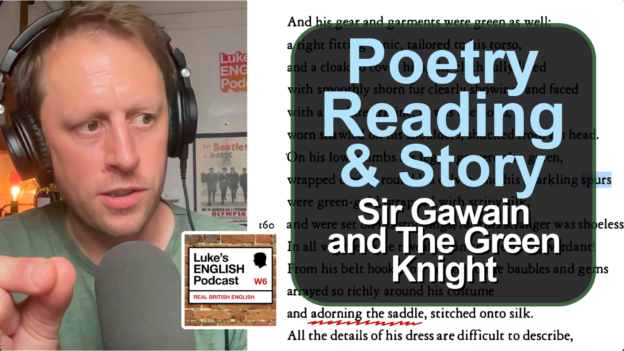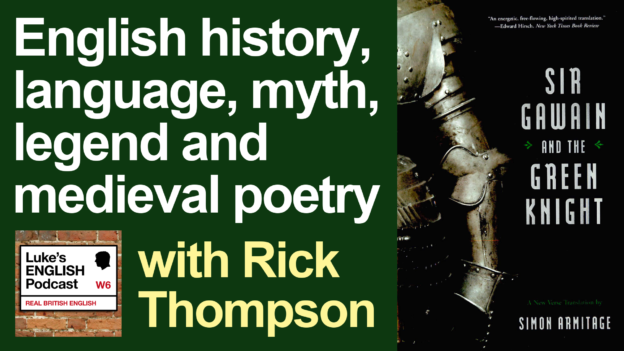🎧 Learn English with a short story. 🗣 Listen & repeat after me if you’d like to practise your pronunciation. 💬 Learn some vocabulary in the second half of the video. This is a story about people watching and what you can notice about people’s relationships if you are observant enough.
📄 Click here to read the story text 👈
Luke’s Vocabulary Notes
- In your early / late twenties, thirties, forties, fifties, sixties, seventies, eighties
- To look married (look good, look tired, look happy, look married, look bored)
- Unmistakably married
- They were married. It was unmistakable.
- Mistakable = easily confused for something else
- Unmistakable = not easily confused for something else – you can immediately identify it
- The unmistakable smell of fresh bread in the air
- They looked unmistakably French / unmistakably English / unmistakably yours/hers/his (this handwriting is unmistakably his)
- Why are they unmistakably married? What does she mean? She’s alluding to subtle behaviour. When a couple are unmarried or perhaps in the early stages of a relationship they tend to give each other a lot more attention. They might be still trying to seduce each other somehow, or to attract each other. There’s still mystery and interest. Brand new couples can hardly take their eyes off each other. I imagine this couple is unmistakably married because they show signs of the relationship suffering from over familiarity. They mystery is gone, maybe. Perhaps they seem very familiar with each other, or very comfortable with each other. Marriage can make people feel stuck (not always!) especially if the marriage is based on the wrong things.
- A banquette = a long, fitted seat or bench, typically found in restaurants
- Narrow – opposite of wide – a long narrow corridor
- We get the sense this is a small, intimate space. It’s also uncomfortable, painfully so.
- The couple and other guests in the restaurant are all so close and this makes the man’s humiliation and the woman’s heartbreak even more painful.
- The narrator is unable to stop “people watching” here – observing this couple opposite.
- Also the couple sit side by side, not facing each other, which suggests that they’re not all that interested in each other.
- You start to speculate – what does this woman mean to this man? Is she there just to sit by his side and look glamorous?
- A round face
- Self-satisfied (definitely a negative word) smug, arrogant, not charming
- Fadingly pretty
- Fading = gradually becoming less clear, less bright, less colourful. Her prettiness was fading.
- A big hat – I imagine it was one of those hats with a big brim, which can be very glamorous but also hides the face.
- Conspicuous = noticeable, easy to notice, eye-catching (apparently in those days big hats were not uncommon in New York restaurants)
- Basically, they looked quite ordinary really, and weren’t trying to grab/attract everyone’s attention.
- An occasion – a particular event, a birthday, an anniversary, something to celebrate
- The wife had planned a surprise for him (past perfect because she planned this before any of the events in this story) without past perfect it could mean that the wife planned the surprise there at the table
- A surprise in the form of a cake – “in the form of” here means that this is how the surprise was actually manifested. I mean, what was the surprise, how did this surprise take shape? The surprised arrived in the form of a cake.
- The gift came in the form of a beautifully wrapped package.
- Their support came in the form of encouraging words during a difficult time.
- The solution to the problem arrived in the form of an innovative new technology.
- Help arrived in the form of my wife who came to rescue me (from an awkward conversation for example)
- A glossy birthday cake = shiny & smooth, so the light reflects off the top. It’s one of those smart, fancy cakes that you see in good quality cake shops.
- One pink candle burning in the center (American English spelling) – this is a little bit sad, isn’t it? Also, if this guy takes himself quite seriously, he might find that a tiny bit embarrassing – bringing attention to him, and this little cake with a pink candle might make him feel a bit ridiculous, especially if he is full of himself and takes himself seriously. But it is a lovely, sweet gesture and we just want him to be embarrassed but also touched and it would be a great moment for him to blush and smile and kiss his wife and maybe acknowledge the other diners with a smile, but he doesn’t.
- The head waiter – so the wife probably asked the restaurant to make a special effort here, which again shows how much care she put into this.
- He placed it before the husband. This means he carefully put it down.
- Meanwhile = at the same time
- The wife beamed with shy pride over her little surprise
- Beamed = her face glowed, she smiled, she seemed proud. To “beam” means that light comes out – like a torch, or a light house. In this case the woman’s face beamed with a certain emotion or an expression.
- Pride – to feel proud = she’s happy and satisfied with what she has done. She’s put a lot of effort into this and expects it to go well. She’s trying.
- It became clear (obvious) at once (immediately) that help was needed (passive voice – needed by who?) We feel that the narrator suddenly sees that this woman is helpless in this situation. She’s in trouble. But nobody can help her without making it worse.
- The husband was not pleased.
- He was hotly embarrassed. – not a common collocation but it tells us that his face probably went red and he was angry.
- He was indignant = angry, annoyed, frustrated with his wife because of what she’s done.
- Don’t be like that = don’t be that way
- As soon as the little cake had been deposited on the table = quite formal and impersonal language, meaning put in a certain place. Money is deposited in an account. It’s quite cold, transactional language.
- The birthday piece – a piece of music
- The general attention had shifted = moved
- I saw him say something to her under his breath = in a very quiet voice, in a whisper, so other people can’t hear
- Some punishing thing = a comment which was designed to punish her, to make her feel bad
- Quick (just a few words) and curt (rudely brief – rude because it is so short) and unkind (cruel).
- I couldn’t bear to look
- Can’t bear to do something
- Can’t stand doing it
- Can’t bring myself to do something
- When I finally glanced over there = looked quickly
- This is heartbreaking!
- Adverbs
- Crying quietly
- Crying heartbrokenly
- Crying hopelessly
- All to herself (she was doing it all by herself, but also crying to herself – a very lonely feeling where you are the only one witnessing your crying – the husband doesn’t care it seems)
- All to herself / all by herself
- Under the big gay brim of her best hat. (Gay in it’s original meaning, “carefree” “happy”)
- The brim of the hat = the wide edge
- This is a particularly sad image because of the contrast between this lovely hat that should be worn on a happy and carefree occasion, but under it this poor woman is crying.









